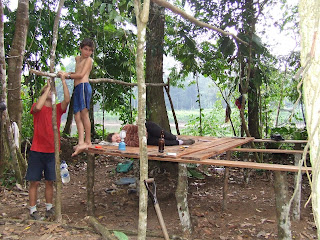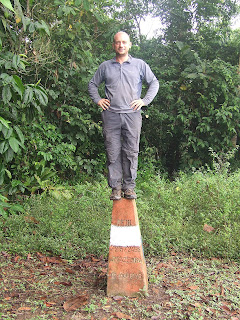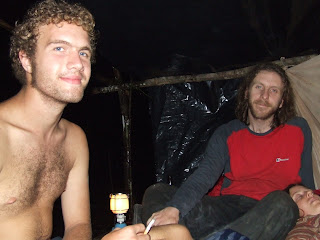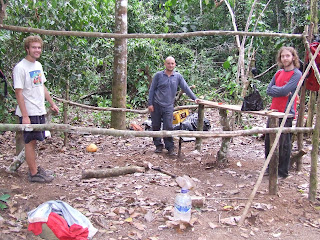BJARKE FRYDENDAL in the BJARKE project
Wednesday, March 21, 2007
Two months with Ecotrackers and Orlando Montufar on the Morona River
My project:
My project was to help a guy called Orlando Montufar with vitalising the zone surrounding the peruvian-ecuadorian border on the river Morona. This river is Ecuador´s most direct way to the big rivers of Peru, the Amazon and Brazil. My work consisted of a lot of different things – all in all I was helping Orlando in whatever he was doing in order to develop the zone in a sustainable way, so people can have alternatives to cutting down trees, fishing, hunting and cattle (which all damage the rainforest). I helped prepare the Ecotrackers house in the village San José de Morona for further volunteers, later on coordinated four volunteers and helped them teach in the village, built a shelter in the middle of the rainforest, and later on I helped prepare a six-day journey to San Lorenzo(the first Peruvian city downriver) in which I also went. My work was very varied and I had a lot of responsibility.
The community of San José:
San José is a colonist cattlevillage very close to the border. People were friendly and welcoming. The men work from morning to evening in their farms a bit outside the village, and the place were a bit boring in the afternoon, when there was nothing to do. There were no young people – almost everybody between 18 and 25 had gone to Macas to study. I had only little contact with indigenous communities, only when I was visiting communities with Orlando. People are still sceptic about the project, but some, the organisation Ecomorona is working well,
The good things:
It was very fascinating to participate in a project, starting almost from scratch. Watching it grow, bit by bit, even building the chairs for the arriving volunteers to save money. I got to see a Peruvian army base from the inside, and visited indigenous villages as they are, with Manchester United T-shirts, boomboxes and so on. It was a really very non-touristy under the skin experience. I learned a lot of things about working like that in a country like this and about organising things. Also it was a great experience to see the Peruvian river villages and especially San Lorenzo (50000 inhabitants, no road access, no cars, no tourists, but apart from that everything you would expect from a city of this size). In fact so great that the next thing I will do is travel to Brazil on these rivers. Other than that, I got to sleep in very savage rainforest a few times which was a great experience.
The wild things:
I slept in only scarcely cleaned rainforest, with a tarantula hidden in the plastic we were sleeping under. I saw landmines. On the boat-trip we stopped in an indigenous community for the night, where nobody had seen a camera before, and the children wanted to touch us.
The future of the project:
I believe that the Morona river has a great potential for both tourism and trade, and with more volunteers coming it will work. There is great interest among the indigenous villages on the river for tourism, and as far as I can see it will work, as long as it receives constant support from volunteers.
All in all evaluation:
The organisation of my project was rather chaotic, also because I was the very first volunteer in the project, in its very initial phase. I am sure that future volunteers will meet the organisation with a clearer idea, and better planning(but of course, they are ecuadorians). Even though, be prepared that the project may differ from the idea you have when you leave Quito. I had a very good experience, for it is a good project, my coordinator was good and I was able to work effectively, which was ultimately what I wanted. For those who want traditional Indian dresses, shamanism and ayahuasca, birdwatching and medical herbs, this is not the project. For those who want and authentic experience of a community close to standing still, a knowledge of the social, economic and political problems that sustainable development confronts in this region and the experience of being part of the real battle (which is neither simple nor romantic), this is indeed the project.
Bjarke Frydendal, Denmark






































Comments